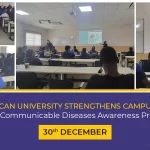Blog Summary
- Introduction
- Exploring Specializations in Bachelor of Public Health (BPH) Programs
- Understanding the Landscape of BPH Specializations
- Making the Right Choice: Aligning with Your Career Goals
- Career Pathways for Graduates with a Bachelors in Public Health
- Diverse Industries: Where BPH Graduates Thrive
- Essential Skills and Competencies for BPH Graduates
- Advising and Mentorship for BPH Students: Finding Guidance Along the Way
- In Conclusion
Introduction
Embarking on a journey in the realm of public health is a pivotal step towards making a lasting impact on the well-being of communities. A crucial decision awaits every aspiring public health professional: the choice of specialization within a Bachelor of Public Health (BPH) program. This choice will profoundly influence your future career path and your ability to address pressing public health challenges. In this comprehensive guide, we’ll delve into the diverse world of BPH specializations, including epidemiology, health policy, environmental health, and more. Our aim is to empower you with the insights necessary to make an informed choice that resonates with your career aspirations.
Exploring Specializations in Bachelor of Public Health (BPH) Programs
When embarking on a journey in the realm of public health, the first step often involves choosing the right specialization within a Bachelor of Public Health (BPH) program. This critical decision can significantly impact your future career path and your contribution to public health. This comprehensive guide will explore the various specializations available within BPH programs, including epidemiology, health policy, environmental health, and more. We’ll delve into the nuances of these specializations, offering insights to help you make an informed choice that aligns with your career goals.
Understanding the Landscape of BPH Specializations
Bachelor of Public Health programs provide a robust foundation in public health principles, allowing students to specialize in various areas of study. Here, we will elucidate the core specializations and why they matter:
- Epidemiology: Epidemiology studies diseases and their causes. If you are interested in understanding the spread and control of diseases, this specialization might be your calling. Graduates often work in research, healthcare, or government agencies to track and manage public health issues.
- Health Policy and Management: If you’re passionate about shaping healthcare policies and improving healthcare delivery systems, this specialization equips you with the skills necessary for roles in healthcare administration, policy analysis, and healthcare management.
- Environmental Health: Environmental health specialists focus on the impact of the environment on public health. This specialization is ideal for addressing issues like pollution, food safety, and environmental factors that influence health outcomes.
- Health Education and Promotion: This specialization is a natural fit for those enthusiastic about educating and promoting healthy behaviours in communities. Graduates often work in educational institutions, public health agencies, or nonprofit organizations to design and implement health education programs.
- Global Health: If you dream of making a difference on a global scale, global health might be your niche. Specializing in global health prepares you to tackle international health issues, collaborate with international organizations, and engage in humanitarian efforts.
Making the Right Choice: Aligning with Your Career Goals
Selecting the right specialization within your BPH program is a critical decision. It’s not just about what interests you the most but also aligning your choice with your career goals. Here are some tips to guide you through this process:
- Self-Reflection: Take the time to reflect on your interests, values, and long-term goals. What public health issues or topics resonate with you the most? Your passion can be a strong motivator.
- Research Specializations: Explore the specifics of each specialization, the coursework involved, and the potential career opportunities. Reach out to faculty and students in your program to gain insights.
- Consider Your Strengths: Identify your strengths and skills. Are you detail-oriented, analytical, or a great communicator? Different specializations may favour different skill sets.
- Industry Trends: Keep an eye on current trends and emerging issues in public health. The field evolves rapidly, and it’s essential to consider the relevancy of your chosen specialization in the job market.
- Networking: Connect with professionals and alums in the public health field. Networking can provide invaluable guidance and insights into various specializations.
Career Pathways for Graduates with a Bachelors in Public Health
Now that we’ve explored the specializations within BPH programs, it’s essential to understand the vast array of career opportunities that await graduates with a Bachelor’s degree in Public Health. The field of public health is dynamic and diverse, offering a wide range of job prospects in various industries. Let’s explore potential career pathways and the sectors that welcome BPH graduates.
Public Health Jobs with a Bachelor Degree
A BPH degree opens the door to numerous career options in public health. Here are some of the critical roles that BPH graduates can pursue:
- Health Educator: Health educators work in various settings, including schools, healthcare facilities, and community organizations. They design and implement programs to promote health and wellness, focusing on educating individuals and communities about healthy behaviours.
- Community Health Worker: Community health workers connect individuals and communities to healthcare services. They often work directly with at-risk populations, guiding healthcare options and resources.
- Epidemiology Assistant: Graduates specializing in epidemiology can assist epidemiologists, helping collect and analyze data to understand and manage the spread of diseases.
- Policy Analyst: Graduates specializing in health policy can find roles as policy analysts, contributing to the development, analysis, and evaluation of healthcare policies at various levels of government and in organizations.
- Environmental Health Specialist: Those specializing in environmental health can work in roles that assess and address environmental factors affecting public health, such as air and water quality or food safety.
- Global Health Coordinator: Specializing in global health can lead to roles as global health coordinators who collaborate with international organizations, NGOs, and governments to address global health challenges.
Diverse Industries: Where BPH Graduates Thrive
The versatility of a BPH degree is one of its greatest assets. Graduates can find meaningful employment in diverse industries, ensuring that their skills and expertise can be applied across various sectors:
- Healthcare: Many BPH graduates choose to work within the healthcare sector, contributing to the delivery and management of healthcare services, hospital administration, and health promotion programs.
- Government and Public Health Agencies: Government agencies at the local, state, and federal levels rely on public health professionals to address pressing health issues, develop policies, and manage public health programs.
- Nonprofit Organizations: BPH graduates often find their calling in nonprofit organizations focusing on public health issues such as disease prevention, access to healthcare, and health education.
- Research and Academia: Some BPH graduates pursue careers in research and academia, contributing to the development of knowledge in public health through research and teaching.
- Environmental and Occupational Health: BPH graduates specializing in environmental health can work in roles that assess and mitigate environmental health risks in manufacturing, construction, and agriculture industries.
- Consulting Firms: Consulting firms often employ BPH graduates to provide expertise in public health issues and assist organizations in making data-driven decisions.
Essential Skills and Competencies for BPH Graduates
A BPH program not only equips you with knowledge about public health but also helps you develop vital skills and competencies valued in the job market. To succeed in public health careers, you need to build the following skills:
- Data Analysis: Public health professionals frequently use data to assess health trends and make evidence-based decisions. Proficiency in data analysis is essential.
- Communication: Effective communication is crucial for conveying public health information to diverse audiences, including policymakers, healthcare providers, and the public.
- Policy Analysis: Understanding health policies and their implications is essential, particularly for graduates specializing in health policy.
- Research Skills: Public health often involves researching health problems and developing solutions. Research skills are invaluable.
- Cultural Competency: Given the diverse populations public health professionals serve, cultural competency is vital to ensure interventions are sensitive to cultural nuances.
- Teamwork and Collaboration: Public health challenges often require interdisciplinary collaboration. The ability to work in teams and coordinate efforts is precious.
- Problem-Solving: Public health professionals are frequently faced with complex health challenges. Problem-solving skills are essential to address these issues effectively.
- Adaptability: The field of public health is ever-evolving, and being adaptable to change and new technologies is crucial for staying current and relevant.
Advising and Mentorship for BPH Students: Finding Guidance Along the Way
As you navigate your BPH journey, seeking guidance and mentorship can be pivotal to your academic and career development. Academic advising and mentorship can provide you with insights, direction, and support as you work towards your goals in the field of public health.
The Importance of Advising and Mentorship
Academic advising and mentorship play essential roles in helping BPH students succeed. Here’s why they matter:
- Guidance: Advisors can guide course selection, helping you align your coursework with your chosen specialization and career goals.
- Career Development: Mentors can offer insights into the practical aspects of public health careers, sharing their experiences and providing guidance on internships and job opportunities.
- Networking: Advisors and mentors can connect you with valuable networks in the public health field, opening doors to internships, research opportunities, and potential employers.
- Support: Advisors and mentors can provide valuable support and solutions when encountering academic or career-related challenges.
Finding Effective Advising and Mentorship
To make the most of advising and mentorship, follow these strategies:
- Engage with Faculty: Establish relationships with faculty members who share your interests or specialize in your chosen field. They can provide valuable guidance and mentorship.
- Connect with Career Services: Your institution’s career services department can connect you with advisors and mentors specializing in public health careers.
- Seek Alumni Mentors: Alumni who have successfully navigated a BPH program can offer unique insights into the challenges and opportunities in the field.
- Join Student Organizations: Participate in public health-related student organizations and clubs to connect with peers, upper-level students, and alums who can provide advice and support.
- Utilize Online Resources: Online platforms and forums can be valuable sources of advice, mentorship, and networking opportunities in public health.
In Conclusion
As you explore the specializations available within BPH programs, consider how each choice aligns with your career goals and interests. Your BPH journey can lead to a wealth of career opportunities in various industries, thanks to the versatile nature of your degree. Cultivate the essential skills and competencies valued in the public health field to stand out as a graduate. Don’t underestimate the importance of academic advising and mentorship in guiding your path.
Remember that your BPH program is not just an educational endeavour but a transformative experience that will prepare you for a meaningful career in public health. So, explore, learn, and be open to the possibilities that the field of public health offers to dedicated and passionate individuals like yourself.












